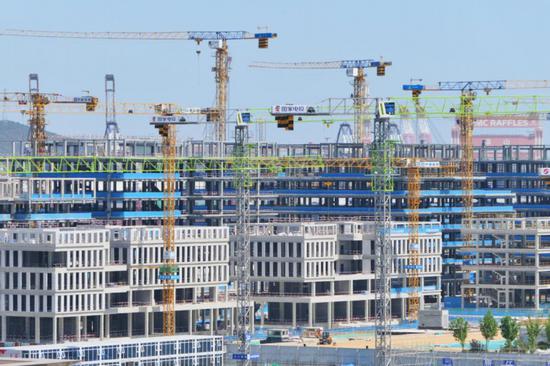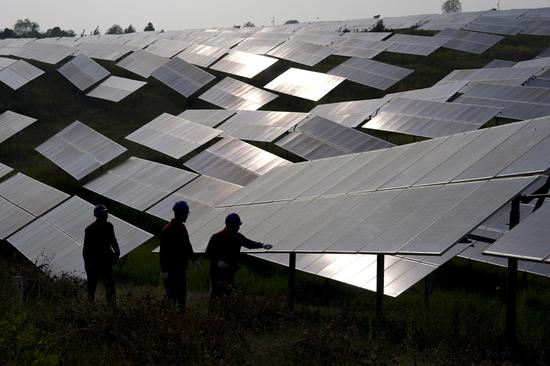
A property construction site in Yantai, Shandong province. (TANG KE/FOR CHINA DAILY)
The recent wave of supportive policies for the beleaguered property industry will guide the real estate market toward stability and recovery, experts said.
The measures announced on May 17 both at the national and local levels vary from city to city to suit specific local conditions. Their intensity and scale are expected to help form a new real estate development model and facilitate the high-quality development of the property industry in China, they said.
Recent measures include lowering of down payment ratios, cuts to mortgage interest rates and efforts to digest home inventories, and came amid mounting market expectations for further measures to boost homebuyer confidence and ease liquidity pressures on property developers.
"We believe the worst is behind the property market," said Chen Sheng, president of the China Real Estate Data Academy.
"The recent real estate policies aim to stimulate market vitality and supplement liquidity needed to balance supply and demand," said Shaun Brodie, head of research on the China market at Cushman &Wakefield, a global real estate services firm.
Brodie said the People's Bank of China, the country's central bank, has issued three consecutive documents aimed at reducing the cost of buying a home and the threshold for homeownership, boosting confidence on the demand side.
"The policies also grant more flexibility to local governments and consolidate their primary responsibilities, requiring them to strike a balance between stabilizing the real estate market and avoiding financial risk."
Pang Ming, chief economist for JLL China, said he believes the combined policy measures will have a positive effect.
"Abolishing the floor limit of commercial individual mortgage rates for first- and second-time homebuyers nationwide, cutting the loan rates of the individual housing provident fund, and lowering the minimum down payment ratios for individuals' commercial housing mortgages will help reduce down payment burden and costs for residents, and hence increase their ability and willingness to purchase houses," Pang said.
Pang also said the latest initiative will help foster a more favorable monetary and credit environment for the stabilization and recovery of the housing market from the demand side. In addition, it will boost residents' consumption capacity, effectively safeguarding and improving people's livelihoods, actively stimulating domestic demand, and harnessing consumption's fundamental role in driving economic growth.
While boosting demand by lowering costs, the country announced the establishment of a 300 billion yuan ($41.4 billion) re-lending facility for affordable housing, to encourage and guide financial institutions to support local State-owned enterprises in acquiring unsold completed commercial housing at appropriate prices.
"The decision is expected to more directly alleviate the liquidity risk of real estate enterprises and consolidate financial stability. Meantime, the government demand as an effective supplement to market demand will contribute to the long-term supply-side structural reform of the real estate market," said Chen Zhixu, senior manager with CBRE China research.
Chen said these measures will capture the spirit of the Political Bureau of the Communist Party of China Central Committee meeting on April 30, which urged the implementation of policies from city to city, ensuring the delivery of property projects, and called for measures to digest property inventories and optimize new demand in a coordinated manner.
"Given its rich content and great intensity, this batch of policies has reflected the Chinese government's resolve to stabilize the real estate market and capabilities in policy planning and innovation. The policies are expected to have an extremely positive impact on the ongoing efforts for property market stabilization and timely home delivery. The sector's decline can be narrowed," Chen said.
Once the new policies are fine-tuned during the follow-up process, market activity and confidence will recover in first-tier cities, and gradually pass on to second-tier and other cities, said Chen Sheng, president of the China Real Estate Data Academy.
Zhang Ange, a white-collar worker at a private firm in Shanghai, said he just bought a 90-square-meter apartment in Jing'an district. "After living and working in the city for eight years, we (my wife and I) finally have a place that can be called home," said the 32-year-old Wuhan native, who became eligible to buy a home in Shanghai as a first-time homebuyer after the city eased homebuying requirements last September.
"I know the market adjustment may continue, but from a living perspective, market ups and downs have little effect on the market for self-use homes," said Zhang.


















































 京公網安備 11010202009201號
京公網安備 11010202009201號